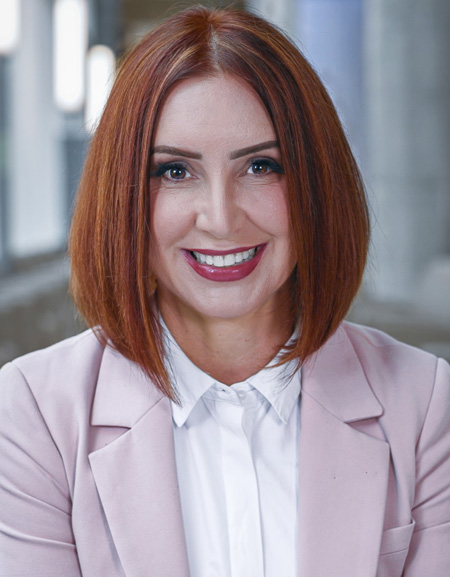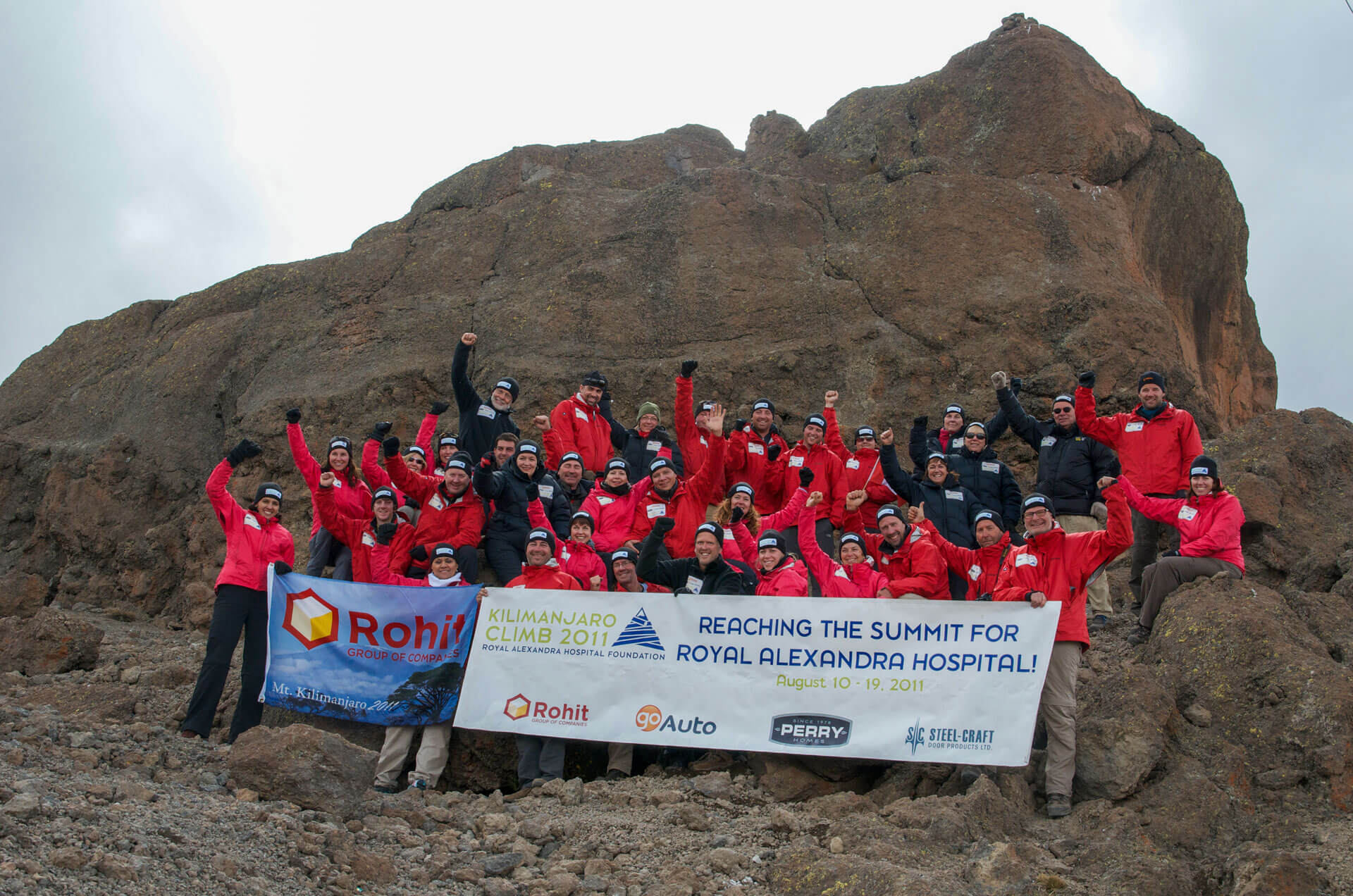MBA grad and Royal Alexandra Hospital Foundation CEO celebrates 20 years building health-care excellence
Looking across the horizon from the Rooftop of Africa, 19,344 feet above sea level, provides a lot of perspective.
For Sharlene Rutherford (Master of Business Administration ’19), standing atop the summit of Mount Kilimanjaro in the summer of 2011 was more than a personal and professional accomplishment. It was a wonderful confluence of leadership, trust-building, planning, and determination to have mustered a cadre of 37 like-minded souls united in their efforts to raise money for advancements in orthopedic surgery at the Royal Alexandra Hospital.
For many, pulling off such an ambitious expedition would be the ultimate career achievement. And while the climb and accompanying media attention captured the hearts of Edmontonians and raised the profile of the Royal Alexandra Hospital Foundation and Rutherford herself, it was not, in fact, the summit of her career.
“That was, for me, a real turning point in my work, and I think my understanding of my own capacity for leadership,” she says. “And that just continued to lead to more growth and good things.”
 In the years since, Rutherford has continued to ascend as a leader as president and CEO of the Royal Alexandra Hospital Foundation and one of its key initiatives, the Alberta Women’s Health Foundation. The charity raises millions annually for the downtown Edmonton hospital, which includes the Lois Hole Hospital for Women and other health centres, and for women’s health and research.
In the years since, Rutherford has continued to ascend as a leader as president and CEO of the Royal Alexandra Hospital Foundation and one of its key initiatives, the Alberta Women’s Health Foundation. The charity raises millions annually for the downtown Edmonton hospital, which includes the Lois Hole Hospital for Women and other health centres, and for women’s health and research.
Along the way, she has summited other milestones such as helping to spearhead a national women’s health network, Women’s Health Collective Canada, and earning an MBA from Athabasca University.
These achievements reflect a journey of discovery and self-improvement that, while not as physically arduous as climbing Africa’s highest peak, were no less satisfying—or revelatory. Rutherford has drawn on these experiences to build better health care for all Albertans, and in particular, to advance women’s health through research and world-class care.
It’s a major challenge—bigger in scale than any mountain. Women’s health research receives just 8% of medical research funding in Canada, and only 3.4% in Alberta.
It’s not just about an additional input of dollars and greater investment, it’s also a matter of ensuring that we move quicker from bench to bedside.

A group of volunteer climbers stop for a photo during their ascent to the summit of Mount Kilimanjaro in 2011.
Help wanted and new directions
This year marks Rutherford’s 20th with the Royal Alexandra Hospital Foundation and her fifth as president and CEO, but her path to leadership as a national women’s health champion was anything but direct.
Born and raised on her family’s farm in Saskatchewan, hospital foundation CEO and community builder is actually her second career. Rutherford is a former journalist who spent the first part of her career working at newspapers across Western Canada.
Community newspapers, she says, were the “heart and soul of a community.” The work allowed her to connect with people and learn about important issues—skills that would eventually serve her later in her career.
“It was an inspiring place to be and an opportunity to lean in, listen, and understand the issues in your community, and to be part of the solutions that make life better for everyone.”
Rutherford eventually moved into magazine publishing and was working for a publishing company in Edmonton when, in 2005, she noticed a job ad for a communications officer position with the Royal Alexandra Hospital Foundation.
Although it was a one-year temporary contract, she was intrigued by the role and the idea of writing communications and marketing material to support a $22-million fundraising campaign for the construction of the Lois Hole Hospital for Women. After years of reporting and receiving story pitches from public relations staff, she’d get to see the other side and in turn, support a cause she believed in.
Finding her footing through mentorship
It didn’t take long for the foundation’s leadership to understand they had hired someone capable of far more than writing ad copy. Within six months, Rutherford was made a full-time employee.
“I learned an awful lot,” she says, crediting much of her early growth to the leadership and mentorship of former foundation CEO and fellow AU alum Andrew Otway (MBA ’14).
I was fortunate in that I was able to watch someone else succeed who was willing to share how they thought about things, so I was able to learn that way.
From email inbox to Kilimanjaro
As anyone who has worked in journalism or communications knows, not a single day goes by without a deluge of cold-call emails from parties around the world interested in selling their wares—be it a story idea, product, or service.
One of those emails was from Ben Webster, a filmmaker and mountaineer offering his services to help non-profit hospital foundations capture the hearts of would-be donors through adventure and inspiration.
While many in her position would have immediately deleted the message, Rutherford was intrigued.
“He was able to really capture the emotion behind a climb and the change in a person as they did the excursion,” she says. “I looked at that email and thought, you know what? There could be something there.”
The storyteller in Rutherford saw the possibilities, and the skills she learned in relationship-building and leadership helped her convince Otway and the foundation’s board to sign on to what became the Kilimanjaro Climb.
The campaign, in support of the Orthopedic Surgery Centre and hip and knee procedures, soon captured the attention of people in Edmonton and beyond as a team of 37 enthusiastic climbers, including four soldiers recovering from injuries while serving in Afghanistan, signed up for the excursion and the cause it supported.
The campaign was a smashing success with media across the province and Canada covering the group’s progress and eventual success in raising $1 million for the centre. After 18 months of planning, Rutherford was among the 28 climbers from the group that made it to the top.
“Qualitative, hard data is always important, but when you can share personal stories, when you can share anecdotes, they’re very powerful. When you marry story and science, you get great results,” she says.
Women’s health and robots
The success of the Kilimanjaro campaign not only brought heaps of attention to the foundation but also to Rutherford herself, who was now in the role of vice-president.
 She would follow up that success with a string of campaigns to support the Royal Alex and women’s health. One of the most memorable came from working with foundation board member Lynn Mandel, wife of Edmonton’s former mayor, Stephen Mandel, to raise money so the Lois Hole Hospital for Women could purchase a Da Vinci surgical robot.
She would follow up that success with a string of campaigns to support the Royal Alex and women’s health. One of the most memorable came from working with foundation board member Lynn Mandel, wife of Edmonton’s former mayor, Stephen Mandel, to raise money so the Lois Hole Hospital for Women could purchase a Da Vinci surgical robot.
At the time, in 2013, the robot was a $4.3-million state-of-the-art surgical system capable of performing minimally invasive, ultra-precise surgeries. The Royal Alex had had one for several years to mostly treat men with prostate cancer—an earlier campaign Rutherford also worked on.
But this would be the first Da Vinci in Western Canada devoted solely to women’s health and operating on cancers of the uterus, endometrium, and cervix. Mandel, an effervescent and wonderful woman to work with, Rutherford recalls, embraced the challenge declaring, ‘If the Da Vinci is good enough for the guys, we deserve a Da Vinci, too.”
“It was a big goal for our foundation, but we achieved it. That robot became one of the busiest in Canada because our surgeons here became incredibly efficient at using it.”
Going back to school
Through those successes, Rutherford continued to develop as a leader, thanks in no small part to Otway’s mentorship. After watching him pursue an MBA and speak highly of the MBA program at AU, she decided to follow suit. At the time, in 2016, Rutherford’s role was largely focused on fund development. But she was also working more closely with the foundation’s finance and operations teams and wanted a greater understanding of matters outside her communications expertise.
As a busy executive, taking time away from work wasn’t an option. AU provided the flexibility to study when it fit with her schedule, which often meant working from her home office until 9 p.m. most nights. “I had wondered if I had bitten off way more than I could chew, but I made a promise to not be too hard on myself and to take it day by day,” she says.
Even though free time was rare for the next three years, the sacrifices of her time and energy started paying off right away. Rutherford says she was able to apply what she was learning almost immediately in her day-to-day role with the foundation.
The MBA immediately unlocked things for me where I could take what I was learning, the academic exercises, and apply them to the day-to-day business functions of our organization.
A champion of women’s health
One of Rutherford’s most satisfying initiatives has been her work launching a new fundraising arm for the Royal Alex foundation, the Alberta Women’s Health Foundation (AWHF), to advance research into women’s health.
One of the challenges in advancing women’s health, she explains, is that research historically has been done almost exclusively on men with results that are applied to everyone.
“We’re now realizing that every cell in our body has a sex: male and female. So, when we invest the time, energy, and resources into better understanding the workings of the female body, we advance in the rest of science, too. If we understand sex as a biological variable, we can use that understanding when studying the heart, the lung, or the brain.”
View this post on Instagram
The AWHF supports about 160 different researchers across Alberta through the Women’s and Children’s Health Research Institute at the University of Alberta.
In her role, Rutherford has advocated for greater national and provincial investments in women’s health care, but also for more collaboration. She helped spearhead the creation of the Women’s Health Collective Canada, an alliance of women’s health and hospital foundations that fundraises and advocates for women’s health.
“Part of starting that with my fellow CEOs who are women is recognizing the need for that leadership,” she said.
There's a big, heavy lift that needs to happen in women's health research, but we're well on our way to getting more hands around the table.
As much as Rutherford is proud of the successes of Kilimanjaro and other fundraising campaigns, she’s grateful that she’s able to focus her time and energy on important issues for women’s health at this stage in her career.
“It's been really fulfilling work. When you can be part of positive change that alters the trajectory of health outcomes for hundreds of thousands of people, that’s really inspiring,” she says.
“Here I am 20 years later and still thinking about what’s next and what else we can do.”